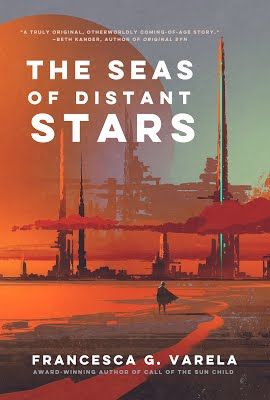
Excerpt
They walked home; through the buzzing silence, through the steady, sweet-warm glow of the inescapable sky, lit aloft by the home sun and the quiet meanderings of the God stars, which now Agapanthus hated—hated, hated, hated, with all her gut and her clenched jaw and all the strength she could pour into the limbs of her weak, young body.
Could the Gods sense this? Could they see or hear inside her mind—inside anyone’s mind—just as they could with the Contact? Was the Contact only special because he could sense their presence there, while all the others remained blind? She hated them. Suddenly she understood how the Others must feel. They were the ones living on the fringes of the frozen lands to the south and the great deserts to the north. Right on the very edge, next to the Waters. During the Awakening, the Gods had only spoken to Contacts living around the equator. The islanders. The Others were not the chosen people. They were primitive; they didn’t have access to the technology of the Gods. No; they still worshipped the old god, the single, fierce god of the underbelly of Deeyae, who they believed controlled the hydrothermal vents, and, thus, all life. But those who worshipped the Gods knew this was not true. They knew that They controlled everything from their high perch on Aamsh and Jord. Without them, the Deeyans would not exist, and all of Deeyae would crumble.
Agapanthus didn’t know whether the Others believed in the Gods. But how could they not? Their touch was everywhere—in the science labs, in the healing centers, in the portation center, in the exchange program headquarters, in the electricity, in every advanced device, every planet-transport machine, every light. But maybe the Others didn’t know about this evidence. Either way, she knew they must hate the idea of the Gods. The idea that the islanders were better than them. Superior, chosen, brilliant. Agapanthus had only seen the Others once, on the way to the Star Festival in the ice lands. They had passed their camp—animal-skin tents, round and low to the ground, and a small gathering area of stones where they probably sat and spoke of their underworld god. But the only Other in view was a young woman. All Agapanthus saw was the back of her head, right outside one of the tents. And then, she remembered, Great-Aunt Tayzaya said something, like, “Poor things.” And they had all gone on, farther and farther from the eternal sun of the equator, into the dark half of the planet. It was always night there; always. They wore special fur suits that covered every speck of skin and body except their eyes. Onward they had walked, over the strange, ticking, cracking ice that smelled of water and soil at once. It was so tiring that Pittick had to carry her in his arms. She fell asleep pressed against his chest. His warmth. When she opened her eyes they had arrived. And that was when she looked up; above them, the sky had melted from red to—to everything. A black sculpture painted with stars, with lights that bulged, and soared, and cascaded; that reflected on the unending ice fields until ground and sky became one, rolling the world into a sphere of light.
“Aga,” Leera had said, crouching to Agapanthus’s level. Her words were muffled through the furs. “There is your home world.” She pointed to a certain light, faintly yellow, unblinking.
It was disappointing. It looked like nothing. Like anything. Like any other star.
“Isn’t it beautiful?” Leera said. “That is your home sun.”
“It looks just like the other ones.”
“Exactly. And they are all beautiful.”





